2024 was a year of progress and collaboration for the Outreach Network for Gene Drive Research. As we start 2025, we take a moment to reflect on the key milestones and achievements of the past year.
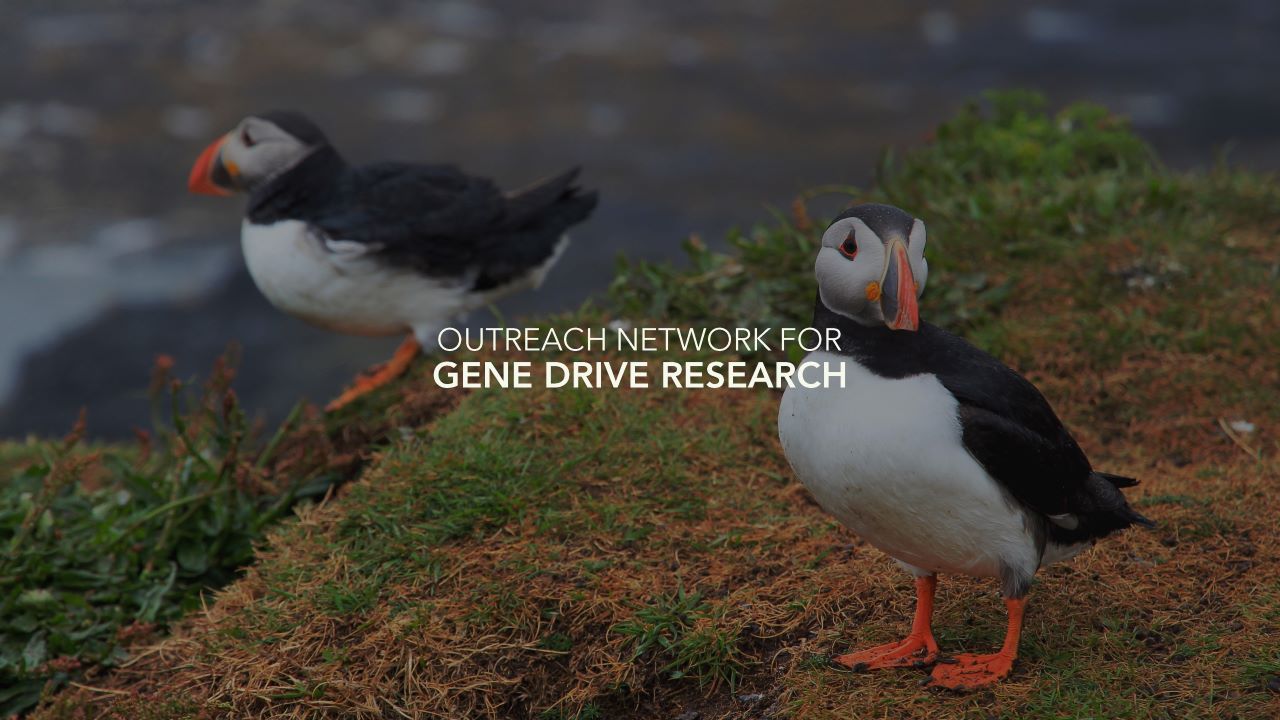
New members
The Network welcomed three new members this year. Transmission Zero, a global malaria research programme working to develop innovative genetic tools to stop malaria transmission; the African Center for Excellence in Molecular Engineering (ACEME) – whose vision is to place African scientists at the forefront of developing innovative solutions to fight vector-borne diseases; and the Champer Lab, which focuses on refining and testing different gene drive approaches and designs in organisms such as the common fruit fly and mosquitoes.

ACEME researchers at work in the laboratory at the University of Sciences, Techniques and Technologies of Bamako (USTTB). Photograph: ACEME
Research and publication highlights
2024 saw the publication of several scientific papers reflecting significant progress in the field of gene drive research. The Alphey Lab de la University of York published research showing that split-drive systems can effectively propagate in caged mosquito populations of Aedes aegypti mosquitoes – which are vectors of several diseases, including dengue – indicating a promising advancement towards more effective measures to fight this vector. Target Malaria, Transmission Zero, the University of California Malaria Initiative (UCMI) and colleagues co-authored a collaborative paper, detailing a potential process for conducting field evaluations of gene drive technologies for malaria control. Additionally, Target Malaria published a mathematical modeling study investigating the potential epidemiological impacts of gene drive releases in West Africa.
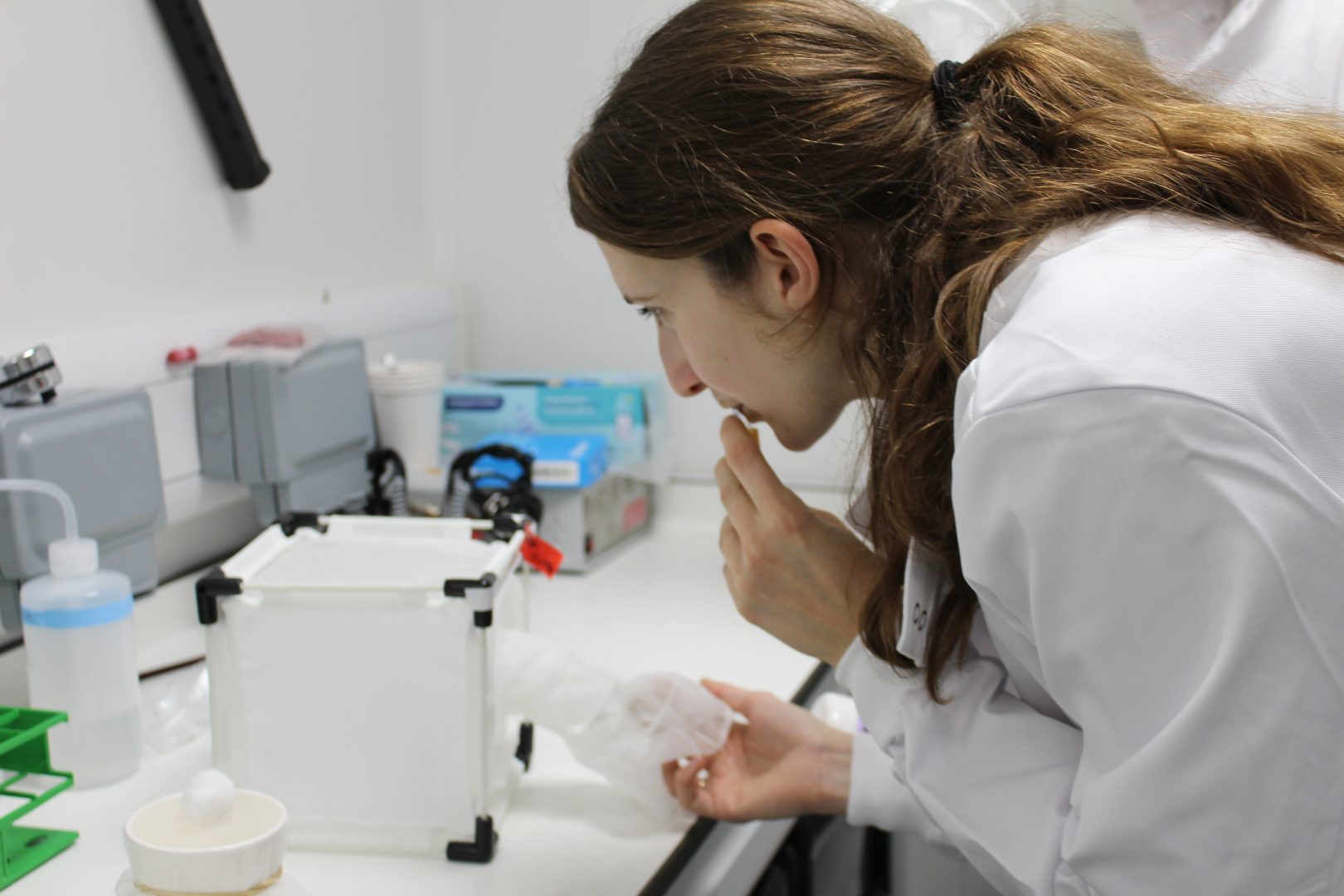
Nicole Page, Post-Doctoral Research Associate, at the Liverpool School of Tropical Medicine (LSTM). Photograph: LSTM
Ongoing work by the Liverpool School of Tropical Medicine (LSTM) is expanding our understanding of Anopheles funestus, a historically understudied but crucial malaria vector in Sub-Saharan Africa. By refining CRISPR-based gene editing tools, LSTM researchers were the first to develop a technology that allows the introduction of precise genetic modifications in An. funestus mosquitoes, opening opportunities for advancing the development of new tools to reduce malaria transmission.
Exploring best practices in stakeholder and community engagement
Stakeholder and community engagement are essential components of responsible gene drive research. In 2024, Network members continued sharing best practices in the field and lessons learnt through a selection of publications. In January, Target Malaria released a publication assessing 10 years of stakeholder engagement to identify good practices that can inform future engagement work on gene drive research in West Africa. In February, the Institute on Ethics & Policy for Innovation (IEPI) examined the progress made in adhering to the Principles of Gene Drive Research, as outlined in the National Academies of Sciences, Engineering, and Medicine’s (NASEM) Gene Drives on the Horizon (2016) report. IEPI’s findings showed significant alignment with the goals and spirit of the Principles within the gene drive research community, from advancing quality science to engaging thoughtfully with affected communities, stakeholders, and publics. In June, UCMI published a paper detailing their engagement approach in São Tomé and Príncipe (STP) over the past five years. In November, another publication from Target Malaria delved into how the project worked to develop a community agreement model for potential releases of non gene drive genetically modified fertile mosquitoes, contributing to the ongoing dialogue on best practices for building legitimacy in the design of community agreement models for genetic approaches to vector control.
Key moments for biodiversity conservation
In the field of biodiversity conservation, members marked key international occasions throughout the year by highlighting ongoing efforts to protect biodiversity. For Invasive Species Awareness Week, Island Conservation highlighted the work they are doing to remove invasive species from islands. For World Wildlife Day, Conservation X Labs shared how they are harnessing digital innovations to address the escalating crisis of biodiversity loss. For International Day for Biological Diversity, Island Conservation highlighted the importance of leveraging research and innovation to address conservation challenges, and how gene drive technologies are being explored as a tool to tackle invasive rodent populations on islands. To mark World Nature Conservation Day, Revive & Restore spoke about the potential of harnessing innovations for coral conservation, including through the use of biotechnology and genetic rescue tools. In November, Island Conservation and colleagues published a study revealing the development of a new method to detect invasive mice and mice carrying a gene drive, paving the way for more targeted invasive rodent control efforts on islands.
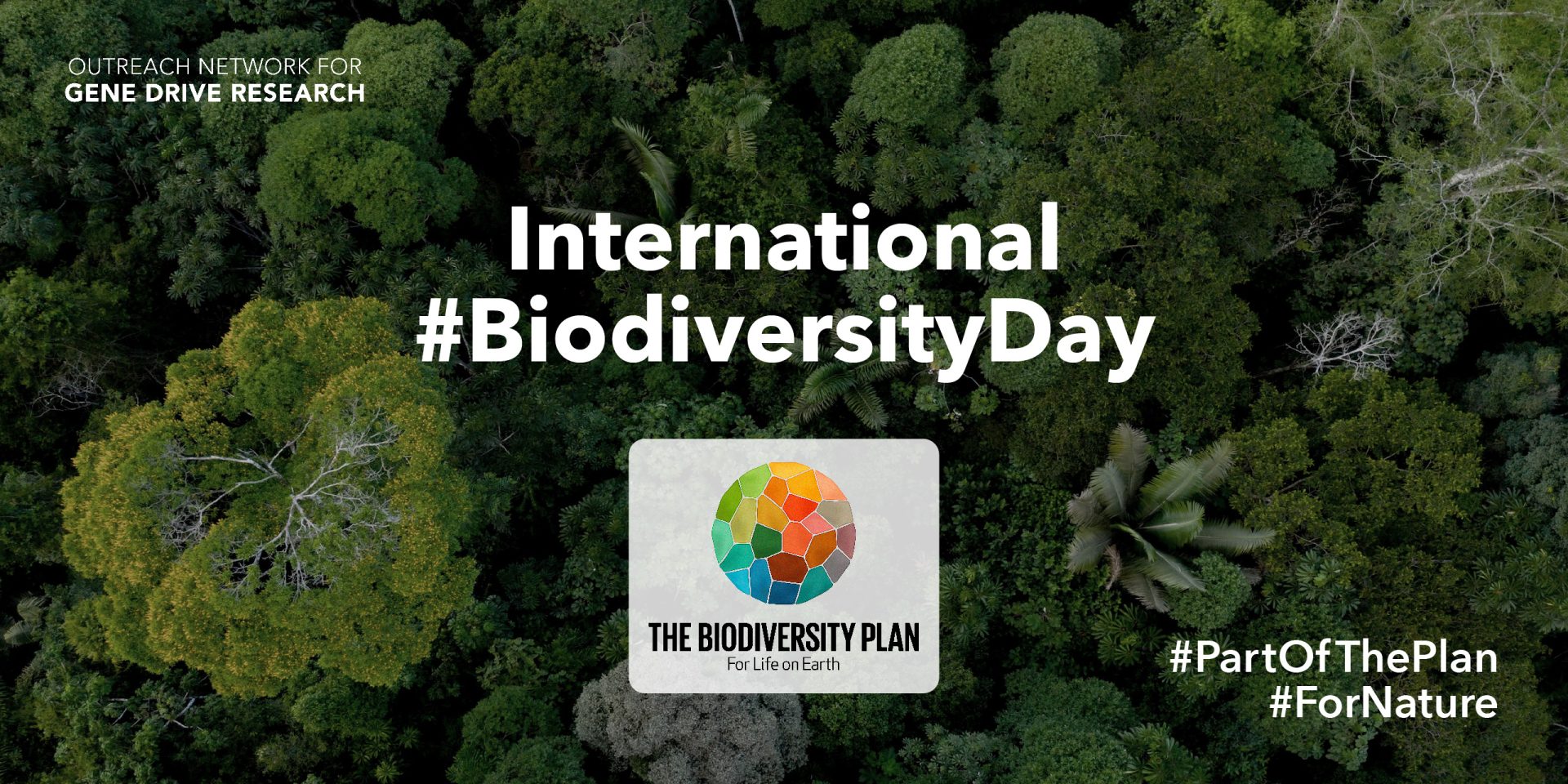
Celebrating key international dates
This year also marked a significant milestone for the Network with the launch of its social media presence on X and LinkedIn. Several campaigns were launched throughout the year to raise awareness of global health and conservation challenges and ongoing research to address these. To celebrate World Malaria Day, we highlighted the profiles of researchers working on innovative approaches to accelerate the fight against malaria for a more equitable world. The Network also marked World Mosquito Day by launching a campaign featuring facts about mosquito-borne diseases, the impact of climate change on disease transmission and ongoing efforts to fight the world’s deadliest creature. For International Day for Biological Diversity, we showcased the profiles of researchers and conservation experts, and their work to build back biodiversity.
Events, conferences and trainings
Several international conferences and meetings were held throughout the year. The Transmission Zero team participated in this year’s Vector Kolymbari Meeting, an international conference that brings together members of the vector biology community. The Network and Target Malaria co-organized a symposium on scaling up innovations for mosquito-borne disease control at the 21st International Congress for Tropical Medicine and Malaria (ICTMM 2024). The Network also organized a symposium on the margins of the Multilateral Initiative on Malaria (MIM Society)’s 8th Pan-African Malaria Conference held in Kigali, Rwanda. The event explored how novel genetic approaches could be integrated into the malaria toolkit and contribute to end malaria. Network members also took part in the Genetic Biocontrol Gordon Research Conference: Enhancing Public Health, Food Security and Biodiversity in Barcelona, Spain to share their knowledge, exchange lessons learned, and discuss best practices in the field of genetic biocontrol. Amidst growing concerns about the adverse effects of climate change on human health, Malaria No More’s Forecasting Healthy Futures Summit convened leaders from around the world in Baku. The summit aimed to facilitate discussions between local and global stakeholders from the climate and health communities in the lead-up to the 2024 UN Climate Change Conference (COP29).
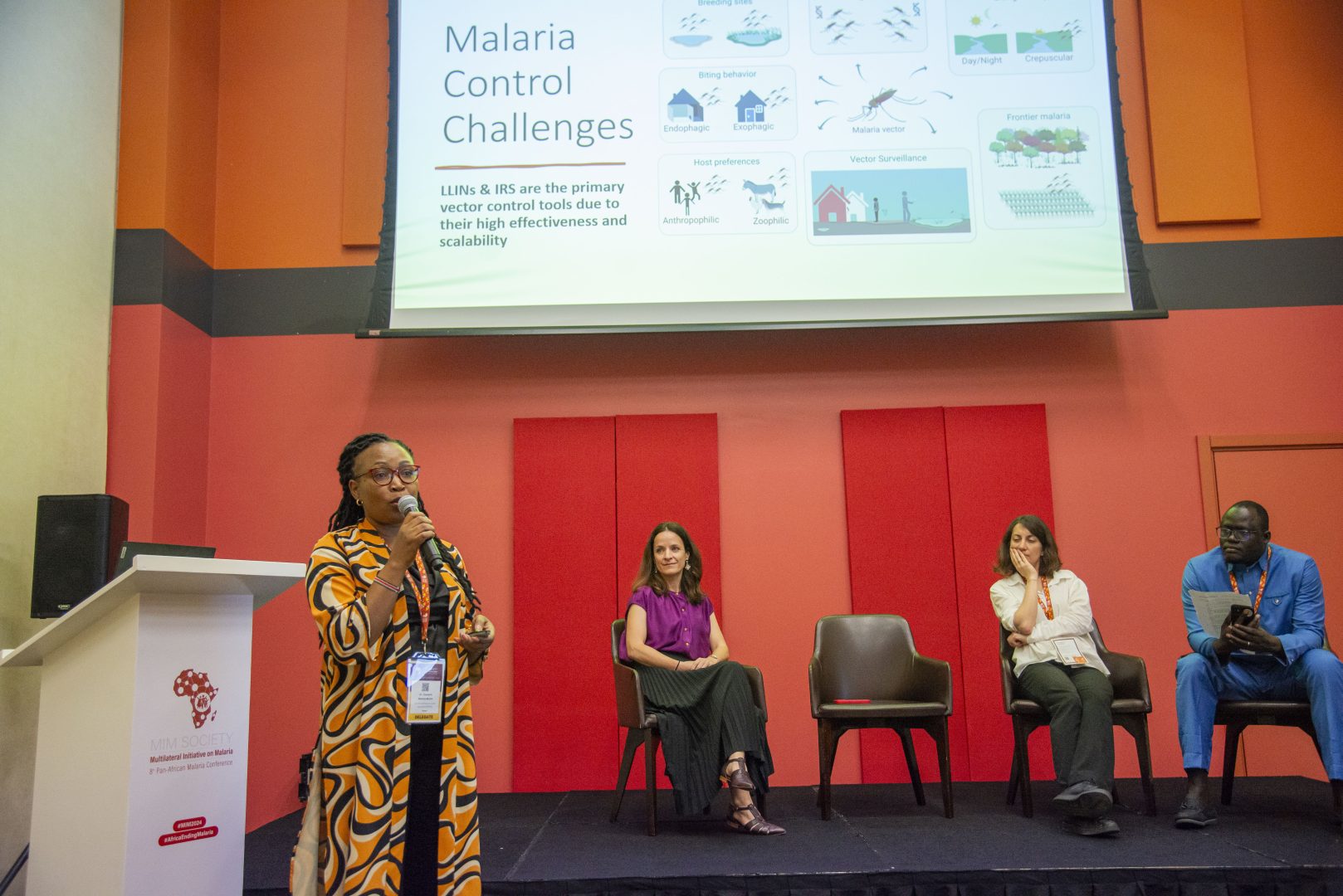
Damaris Matoke-Muhia, Kenya Medical Research Institute (KEMRI), presenting at the symposium “Integrating genetic approaches in the malaria toolkit” at MIM’s 8th Pan-African Malaria Conference
In March, the Network and the Pan-African Mosquito Control Association (PAMCA) also hosted the third and final webinar of the Gene Drive Webinar Series on regulatory and governance considerations for gene drive research. The GeneConvene Global Collaborative, in partnership with Uru Research and Development Group and the Department of Molecular Biology and Biotechnology of the University of Dar es Salaam (UDSM), hosted the fourth and fifth edition of Gene Editing: A Short-course for African Bioscience Professionals. The courses brought together science professionals from different African countries, providing opportunities for knowledge exchange, skill development and networking. In November, Prof. Tony Nolan, LSTM, presented at the “RAFT TechTalk: Could we eradicate Anopheles stephensi in Africa?” – a webinar exploring potential strategies to control this invasive mosquito species, with a focus on genetic approaches.
Policy milestones
2024 was marked by major policy milestones: the twenty-sixth meeting of the Subsidiary Body on Scientific, Technical and Technological Advice (SBSTTA-26) and the Sixteenth meeting of the Conference of the Parties to the Convention on Biological Diversity (COP 16). In May, Members of the Network joined delegates from around the world in Nairobi at SBSTTA-26 to review topics of interest such as synthetic biology, risk assessment, the Global Biodiversity and Health Action Plan, and indicators of the Kunming-Montreal Global Biodiversity Framework (GBF). The Network co-hosted a side event exploring how innovative approaches can help address current biodiversity and health crises in the face of climate change.
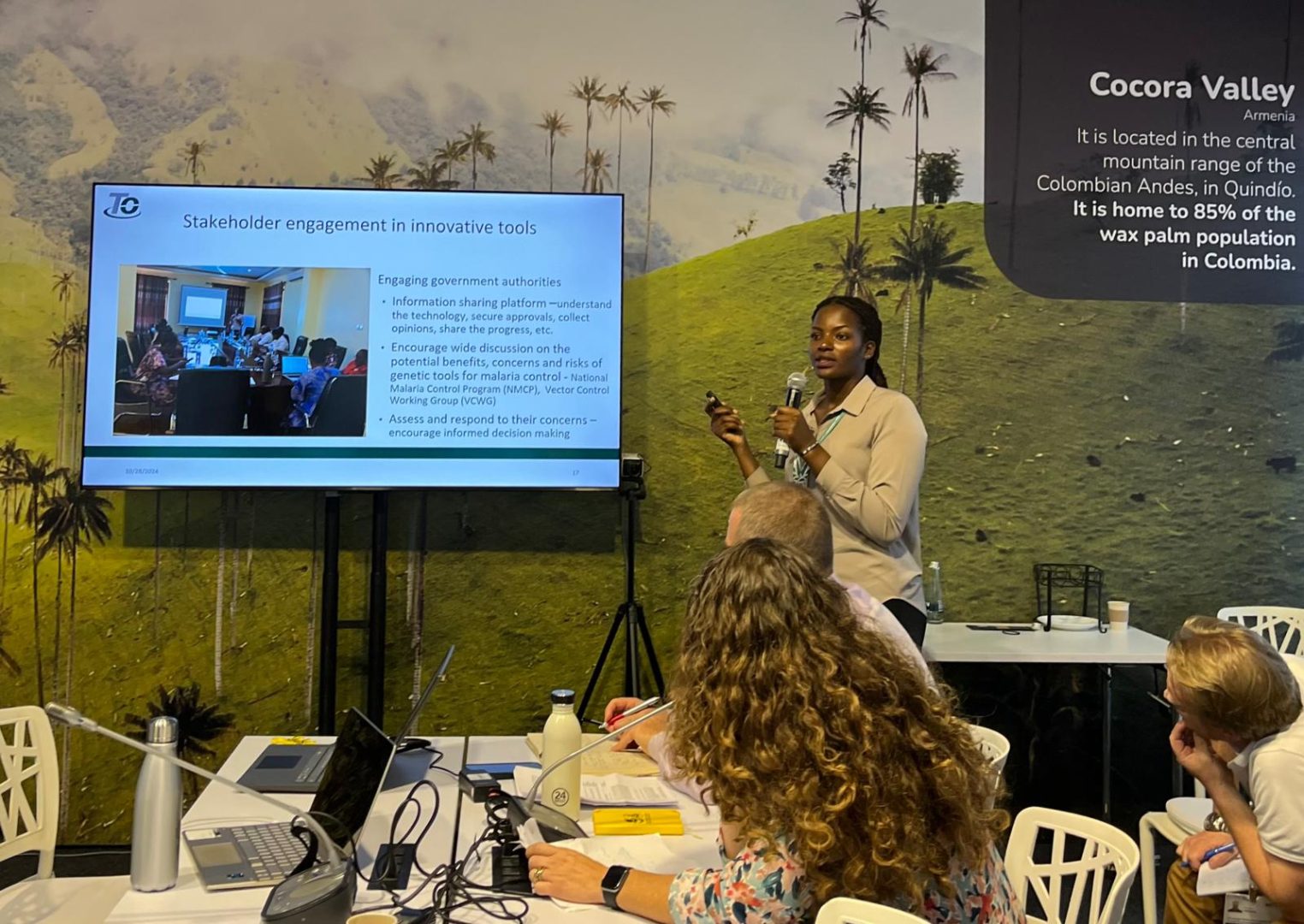
Felista Tarimo, Transmission Zero, presenting at the “Addressing the impact of vector-borne diseases on biodiversity and health” side event in Cali, Colombia, during CBD COP16 meetings
Topics discussed at SBSTTA-26 were carried forward to COP 16 meetings, which took place in October, in Cali, Colombia, for further negotiation and adoption as part of global biodiversity policies. CBD members adopted new and voluntary guidance to assess living modified organisms containing gene drives and decided to develop a `capacity-building action plan to help countries research, use and benefit from synthetic biology. Island Conservation and Re:wild co-hosted a panel showcasing how innovative approaches could be leveraged to address the impact of vector-borne diseases on biodiversity and health. The event featured experts from both organizations and from Transmission Zero and Instituto Tecnológico Vale (ITV). Representatives from Conservation X Labs, Target Malaria, Leibniz Institute for Zoo and Wildlife Research, The Coalition for Conservation Genetics, and the South African National Biodiversity Institute (SANBI), also participated in a panel discussion exploring how new tools can complement existing conservation efforts, help protect biodiversity and achieve sustainable development.
2024 was an eventful year for the Network filled with progress and innovation. As we turn to 2025, we look forward to building on this momentum and to further collaboration and advances in the field of gene drive research.
